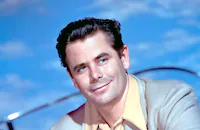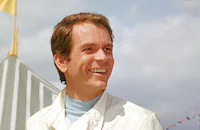Imitation General

Brief Synopsis
Cast & Crew
George Marshall
Glenn Ford
Red Buttons
Taina Elg
Dean Jones
Kent Smith
Film Details
Technical Specs

Synopsis
In 1944 France after a devastating battle, scattered American ground troops find themselves disorganized and surrounded on all sides by German forces. Cut off from their company and without a radio, U. S. Army Brigadier-General Charles Lane, Sgt. Murphy Savage and Corp. Chan Derby come upon a small group of leaderless soldiers whom Lane encourages and organizes. At a nearby farmhouse, owned by the charming but irate Simone, Lane realizes upon examining his map that they are in the middle of a two-mile gap in the American line. Although Simone, who speaks no English, blames the Allied bombings for the destruction of her farm and the local village, she grudgingly allows the men to set up an impromptu command post after Derby offers her food supplies. Murph and Derby are surprised by Lane's determination to remain in the field to organize and lead a new offensive to plug the two-mile gap.
While patrolling an area near the farm, just as Lane and Murph spot a German observation post atop a ridge, Lane is gunned down by a German machine-gun nest hidden in a ditch. With Derby's assistance, Murph destroys the nest. After taking Lane's body to the farmhouse cellar, Murph and Derby then lament his death and wonder what to do next. Meanwhile, some soldiers direct Corp. Terry Sellers, lost in the field, to the farmhouse, and seeing Murph holding Lane's helmet, believes that he is the general. Overcome by fatigue, Sellers collapses in despair until Murph rouses him using Lane's uplifting phrases. Realizing that the disorganized foot soldiers are in desperate need of leadership and wanting to honor his long time commander, Murph decides to continue impersonating Lane in order to carry out the general's plan. Derby warns Murph of the dangers of impersonating an officer, but ultimately agrees to support him. Uncertain of Murph's intentions, Simone grows suspicious when Murph asks her to pin Lane's star on his collar. Murph and the recovered Sellers then drive the jeep out to the soldiers in the field where Murph is startled by the appearance of Lt. Jeff Clayton, who looks to the "general" for orders. Clayton and the men are impressed when Murph declares that he and Sellers will take out the observation post themselves, thus convincing Clayton that the courageous "general" is a West Point graduate.
Meanwhile, at the farm, Derby is dismayed by the appearance of Pvt. Orville Hutchmeyer, his and Murph's former master sergeant in boot camp. Having been busted to private after Murph turned him in for cheating, Hutchmeyer longs for revenge, and consequently, Derby tries to convince him that Murph is dead. After strapping half of a blown up boiler tank to the jeep for use as a shield, Murph and Sellers drive directly to the enemy observation post and destroy it, to the cheers of the American soldiers below. Upon returning to the farmhouse, Murph panics when Derby tells him of Hutchmeyer's presence, but Derby assures him that Hutchmeyer has been commandeered by the enthusiastic Clayton. Derby then reports that Simone has helped medics turn the barn into an aid station and that two American tanks are nearby. When Murph spots Hutchmeyer returning to the farm to romance Simone, he locks himself in the bedroom with her. While Murph yells and bangs furniture around the terrified Simone, Derby persuades Hutchmeyer to believe that the "general" is making love to Simone. After Hutchmeyer's departure, Murph apologizes to the bewildered Simone, then he and Sellers position the tanks at a small bridge behind the farm where he suspects the Germans may attempt to cross. Clayton then returns with a captured German who reveals that a Panzer brigade is approaching.
Murphy conceives of a plan to convince the Germans that the bridge is mined, hoping to persuade them to cross the dried creek bed instead, and thus expose their unprotected bottom side to attack by the American tanks. While waiting for the Panzers, Murph confesses to Derby his apprehension about putting so many men at risk and perhaps ruining Lane's reputation. Two Panzer tanks arrive at the bridge and, as Murph intends, cross the creek ditch. One is blown up by the American tanks, the other chased down. Clayton then reports that four Panzers have broken through further up the creek. Clayton's men have stopped two, but the others are approaching the farmhouse. Murph then takes Derby and Sellers to set up an ambush for the German tanks. After the tanks are disabled in the ambush, Clayton and his men arrive as back up, but when Murph sees Hutchmeyer, he hides and Derby pretends the "general" has departed. A barrage sends the men scurrying for cover and Murph is knocked out by flying shrapnel. Derby manages to cover Murph's face when Hutchmeyer helps carry him back to the farmhouse.
That evening when Murph revives in the cellar, Derby relates the news that the bombardment was from Allied reinforcements who arrived shortly after the tank assault. Lane's death has been reported by radio, allowing Murph to resume his own identity. Relieved and pleased that Lane will be credited for the stand at the farmhouse, Murph agrees they must rejoin their outfit, but is displeased to hear a drunken Hutchmeyer upstairs serenading Simone. Murph then pretends to be his own ghost to frighten Hutchmeyer, allowing Murph and Derby to capture Hutchmeyer, tie him up and return him to his outfit. Murph thanks Simone for her kindness and bids her goodbye as Sellers returns, determined to continue serving with his favorite general.

Director

George Marshall
Cast

Glenn Ford

Red Buttons

Taina Elg

Dean Jones

Kent Smith
Tige Andrews
John Wilder
Ralph Votrian
Buzz Henry
Hugh Pryor
Frank Francesco
Barry Cahill
Bob Dennis
Bob Nichols
Paul Smith
Joe Di Rede
Ralph Reed
Harry Harvey Jr.
Taldo Kenyon
William Barker
Dan Tana
Frank Oberschall
Paul Busch
Otto Reichow
Henry Rowland
Pat Miller
Morgan Jones
Peter Miller
Lester Hoyle
Fred Kruger
Crew
Mary Bashe
Kenny Bell
Carl Beondi
William Bowers
Howard Bradner
Maj. Carl Brady U.s.a.
James Brock
Malcolm Brown
Ted Butcher
Harold Clifton
Loren Cosand
Robert Ellsworth
George J. Folsey
Keogh Gleason
Henry Grace
Sydney Guilaroff
Darrell Hallenbeck
William Hawks
William A. Horning
Paul Keeler
Paul Koons
Harold F. Kress
Dr. Wesley C. Miller
Tony Ordoqui
Anthony Piccino
Robert Saunders
Al Shenberg
Tommy Smith
Fritz Steinkamp
Jack Swain
William Tuttle
Glenn Wright

Videos
Movie Clip


Film Details
Technical Specs

Articles
Imitation General
Director George Marshall and actor Glenn Ford must have enjoyed making comedies together. During the years 1958 and 1959, they collaborated on no less than four films, two of which, It Started with a Kiss (1959) and Imitation General, were military-themed.
Based on William Chamberlain's short story Imitation General, which appeared in the November 17, 1956 edition of The Saturday Evening Post, the film centers on the exploits of a World War II sergeant (Ford) who must masquerade as his commanding general (Kent Smith) when the general is killed in action. The sergeant must use this disguise to keep up the morale of the men and rally them to counter-attack the Nazi forces in France.
Film critic Bosley Crowther, who was never one to pull his punches when it came to reviewing films, wrote in his August 21, 1958 evaluation of Imitation General, "The situation is preposterous and the tactics the impostor contrives are so vague and helter-skelter that it's hard to tell what's going on, except that our side is winning and lots of Germans are being killed...The thing about this sort of humor is it has to be right to sound true, it has to have the ring of authenticity in concept as well as in the words. And this calls for more than accurate writing; it calls for accurate delivery, too. There are few things more depressing than soldier humor that is badly forced or fake. Fortunately, the dialogue in this romp is pretty genuine, after allowance is made for the omission of the inevitable scattering of naughty words. William Bowers has concocted a screenplay from a story by William Chamberlain that is salted with soldier skepticism and wisecracks of sharp and icy mirth. And George Marshall has conned their delivery in lively and flavorsome style by Red Buttons, Tige Andrews, John Wilder, Dean Jones and even Glenn Ford. This is fortunate, we say, because the story of Mr. Chamberlain and Mr. Bowers is a plainly contrived piece of play-stuff that tends to get badly confused. Furthermore, the authors and director bandy weapons and killings tastelessly in the midst of what has the nature and the attitude of farce. It is not nice to see fleeing soldiers cut down by machine-gun fire or caught in tanks that are blithely exploded, all in the way of fun."
Imitation General was to have made its television debut in November 1963, but after the assassination of President John F. Kennedy, the network pulled the film. It was the wrong kind of humor for that time of tragedy.
Producer: William B. Hawks
Director: George Marshall
Screenplay: William Bowers, William Chamberlain (story)
Cinematography: George J. Folsey
Film Editing: Harold F. Kress
Art Direction: Malcolm Brown, William A. Horning
Cast: Glenn Ford (MSgt. Murphy Savage), Red Buttons (Cpl. Chan Derby), Taina Elg (Simone), Dean Jones (Cpl. Terry Sellers), Kent Smith (Brig. Gen. Charles Lane), Tige Andrews (Pvt. Orville Hutchmeyer).
BW-89m. Letterboxed. Closed captioning.
by Lorraine LoBianco
SOURCES:
The Internet Movie Database
All-Movie Guide
"That Funny War; G.I. Humor Prevails in 'Imitation General'" by Bosley Crowther, The New York Times, August 21, 1958

Imitation General
Quotes
Trivia
Notes
According to March 1957 Hollywood Reporter and Daily Variety news items, writer Gil Doud was to prepare a treatment of William Chamberlain's short story, which was published in Saturday Evening Post, but his contribution to the final script, if any, has not been confirmed. The Variety review incorrectly lists hair stylist Sydney Guilaroff as the film editor.

Miscellaneous Notes
Released in United States Summer July 1958
CinemaScope
Released in United States Summer July 1958













